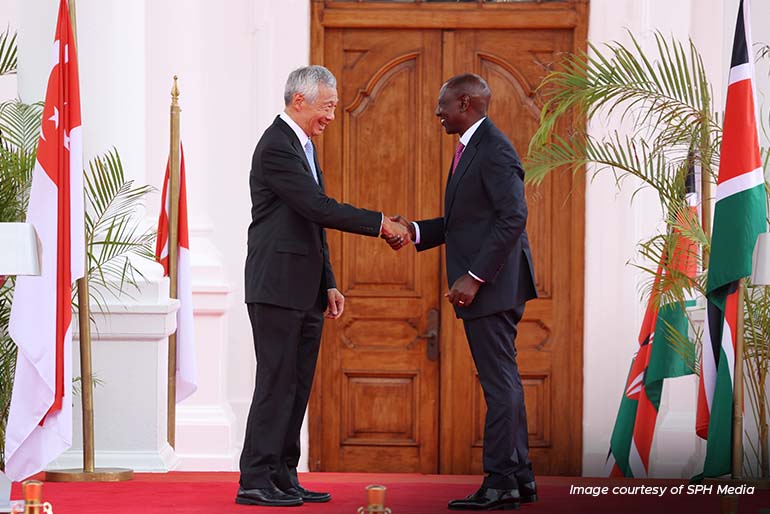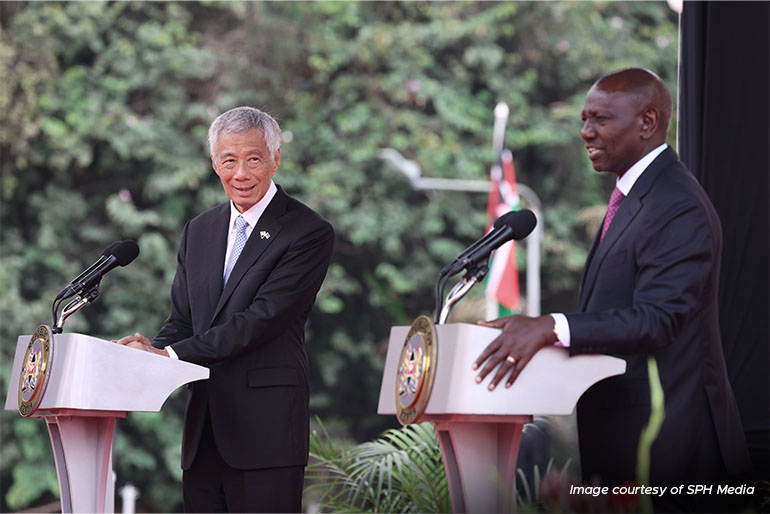The other two MOUs will see Singapore and Kenya expand cooperation in the information and communications technology space in new areas such as cyber security, as well as in skills development through knowledge sharing and capacity-building activities.
At a press conference following their meeting, PM Lee welcomed the taking effect of the bilateral investment treaty and avoidance of double taxation agreement, and hoped it will occur as soon as possible. This will send a strong signal to businesses and provide clarity and assurance on cross-border transactions and investment, he said.
The two leaders had agreed during their meeting to speed up the operationalisation of the two agreements, which were signed when then Deputy Prime Minister Tharman Shanmugaratnam visited Kenya in 2018.
The investment treaty will grant Singapore investors protections such as non-discriminatory treatment compared with other foreign investments, protection from illegal seizure of property, and the freedom to transfer capital and returns in and out of the country, among other things.
On the sustainability agreement, PM Lee called climate change an existential challenge for all countries. As such, the carbon credits agreement is one of the ways by which countries can work together to reduce carbon emissions and slow global warming, so that mankind has time to adapt.
“In Singapore we see warmer weather, you may think it’s just a blip, but actually it’s a long-term trend, and it’s going to accentuate,” he said. “Africa and Kenya will also see extremes of weather, extremes of drought and floods, and it’s existential because human beings, cattle, wildlife – all are threatened when the climate gets extreme.”
Mr Ruto said the carbon trading market is an answer to climate change that moves the conversation away from finger-pointing to focus on ways for developing countries to finance the mitigation and adaptation actions they need to take to deal with the phenomenon.
Noting that 25 per cent of carbon trading in the African continent today takes place in Kenya, Mr Ruto said the agreement with Singapore underscores the opportunities for Kenya to work with various countries to help them meet their NDCs.
Following the signings, PM Lee said Singapore and Kenya have similar aspirations for their peoples despite the geographical distance, such as inclusive growth, a high standard of living, and ethnic and religious harmony.
“We both worry about growing geopolitical tensions, rising protectionism, threats to the multilateral trading system, inflation, pandemics and climate change,” said PM Lee.
“We agreed that it was important that countries continue to work towards building linkages in the digital economy, cooperating on food, energy security and sustainable development.”
This is why both sides have been cooperating closely in diverse areas such as governance, public service administration, urban planning and liveable cities, he said. Singapore and Kenya celebrated 30 years of diplomatic relations in 2021.
He noted that the two countries are also doing more business together. Two-way trade has grown 2½-fold since 2017, and in 2022 amounted to over $212 million. Singapore companies with a presence in Kenya include those in shipping, logistics and port management, agribusiness, hospitality and fintech.
Singapore and Kenya also work well in multilateral settings such as the UN, he said. At their meeting, the two leaders reaffirmed their shared commitment to multilateralism and a rules-based global order, and to cooperate on UN reform to enhance its effectiveness.
The latest pacts aside, there is still much scope for the two countries to work more closely together, said both leaders.
Mr Ruto said Kenya wants to acquire knowledge and support from Singapore on its public housing model, which he described as one of the most successful in the world. He said he has also invited firms from the Republic to invest in areas such as Kenya’s transport and logistics sectors.
“(PM Lee’s visit) is that testimony for us to read how a country so small, with no endowments, with no natural resources, that was not rich at all and had no inheritance, made a success of itself by making the right decisions,” he said.









